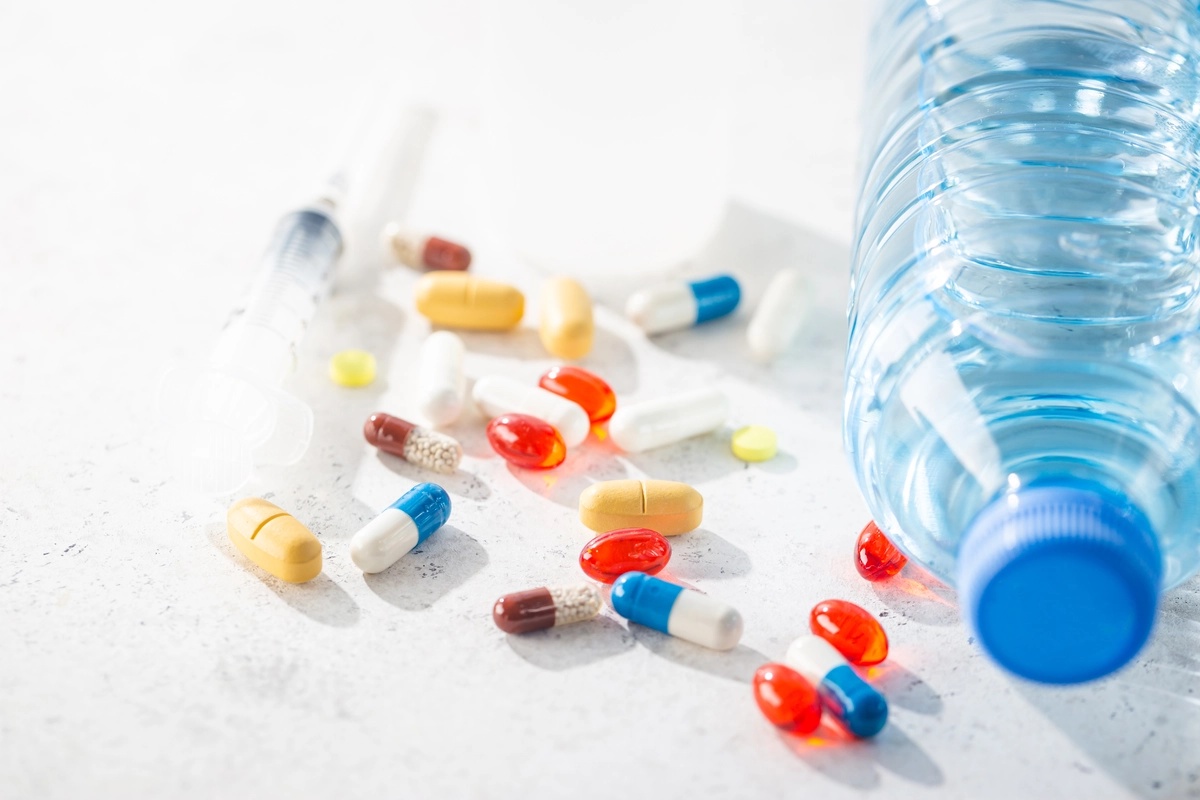Drug Detox: What to Expect From the First Stage of Recovery


When it comes to drug detox, the journey can be overwhelming. On one side, the promise of a fresh start beckons, while on the other, the challenges of withdrawal loom large.
At its core, drug detox is about breaking free from drug addiction and embracing a healthier future. It involves facing discomfort to pave the way for healing and recovery. Understanding the process, seeking professional help, and staying committed are key elements in this transformative journey.
What Is Drug Detox?
Drug detox is the first stage of drug rehab for individuals struggling with drug addiction. It involves removing harmful substances from the body and managing withdrawal symptoms, which can range from mild to severe depending on the type of drug and level of dependence. The goal of drug detox is to rid the body of toxins and prepare it for further treatment.
Detox Basics
Detoxification is crucial in managing withdrawal symptoms post-substance use. Medications play a vital role in ensuring a comfortable detox process for individuals. The length and intensity of withdrawal during detox are influenced by various factors like the substance used and the individual's overall health.
Different substances have varying detox timelines; for instance, alcohol detox typically lasts around one week, while benzodiazepines may require a more extended period. Post-detox, long-term changes are crucial to prevent relapse. Inpatient and outpatient rehab programs offer support in developing new coping mechanisms.
Detox Duration: How Long Does Drug Detox Take?
The length of time drug detox takes depends on many factors. The type of drug used, the duration of substance abuse, and individual factors such as age, health status, and metabolism all play a role. In general, detox can take anywhere from a few days to several weeks.
Drug detox isn't a race. It's a carefully managed process that must be done at the individual's pace. Some people may need longer detox periods due to their body's dependence on drugs, while others may progress faster.
After completing detox, individuals must focus on making long-term lifestyle changes to maintain sobriety successfully. Inpatient rehab provides intensive therapy and support, while outpatient programs allow individuals to continue their daily routines while receiving treatment.

How Does Drug Detox Work? A Look at the Detox Process
The process of drug detox involves three main stages: evaluation, stabilization, and transitioning to further treatment.
Evaluation Phase
During the evaluation phase, healthcare professionals screen patients for physical and mental health conditions that may impact their detox journey. Comprehensive histories and blood tests are conducted to assess the patient's overall health status accurately. This phase plays a critical role in tailoring an effective detox treatment plan for each individual.
Stabilization Phase
The stabilization phase involves taking steps to ensure patients are safe and comfortable throughout the detox process. Addiction treatment medications may be administered to alleviate withdrawal symptoms and reduce cravings. The primary goal of this phase is to stabilize patients physically and mentally before proceeding with further treatment.
Treatment Preparation
Patients are prepared for entry into post-detox treatment by familiarizing them with what to expect during therapy sessions. Setting clear expectations helps individuals understand the treatment process better and encourages active participation in their recovery journey.
Are You Struggling with Mental Health or Addiction?
We Can Help. Call Us Now!
CALL: 877-839-1772
Drug Detox by Substance
Different types of drugs may require different detox approaches. Here's what you can expect during drug detox for some commonly abused substances:
Alcohol Detox
Alcohol detox involves specific considerations and challenges due to the nature of alcohol dependence. The process can lead to severe withdrawal symptoms, including anxiety, tremors, and hallucinations. Seeking professional help is crucial for a safe alcohol detox to manage these symptoms effectively.
The timeline for withdrawal symptoms during alcohol detox varies based on individual factors, typically starting within 6-24 hours after the last drink. Symptoms may peak around 72 hours and gradually subside over the following days. Medical supervision is essential during this period to address any complications that may arise.
Opioid Detox
Opioid detox presents unique challenges as individuals may experience intense cravings and physical discomfort. Withdrawal symptoms specific to opioids include muscle aches, nausea, and insomnia. Medical supervision is necessary to manage these symptoms and prevent potential relapse during the detox process.
During opioid detox, the intensity of withdrawal symptoms peaks within 72 hours after the last dose. The duration of these symptoms can vary but typically lasts for 5-7 days. Having medical support ensures proper monitoring and intervention in case of severe withdrawal effects.
Meth Detox
Meth detox can produce severe psychological and physical symptoms, making it one of the most challenging substances to withdraw from. Withdrawal symptoms may include paranoia, fatigue, and depression, among others. Due to these potential complications, professional medical supervision is highly recommended during meth detox.
The withdrawal timeline for meth varies depending on individual factors but typically begins within 24 hours and can last for 2-3 weeks. Medical professionals may use medication to manage cravings and other symptoms during this period.
Cocaine Detox
Cocaine detox can also be challenging due to the intense cravings and potential psychological effects. Withdrawal symptoms may include depression, agitation, and fatigue. Medical supervision is essential during cocaine detox to manage these symptoms and prevent relapse.
The timeline for cocaine withdrawal typically starts within 24 hours after the last use and peaks around 3-4 days. It can take up to 2-3 weeks for symptoms to subside, and having medical support can make the process more manageable.
Cannabis Detox
While cannabis detox may not produce severe physical withdrawal symptoms, individuals may experience psychological effects such as anxiety, irritability, and insomnia. Medical supervision can help manage these symptoms and provide support during the detox process.
The timeline for cannabis withdrawal varies based on individual factors but typically starts within 24-72 hours after the last use and can last for several weeks.
Stimulant Detox
Detoxing from stimulants involves its own set of challenges, such as fatigue, depression, and agitation. Withdrawal symptoms for stimulants can be intense initially but tend to decrease over time with professional guidance and support. The process requires close monitoring due to potential mental health implications.
The timeline for stimulant detox varies depending on the substance used but generally involves an initial phase of heightened symptoms followed by gradual improvement. Professional guidance is crucial in managing these fluctuations effectively to ensure a successful detox outcome.
Prescription Drug Detox
Detoxing from prescription drugs requires careful consideration due to the risks involved, including potential rebound effects or worsening of underlying conditions. Withdrawal symptoms specific to prescription drugs may include anxiety, insomnia, and gastrointestinal issues. Tailored detox plans are essential to address individual needs during this process.
Individuals undergoing prescription drug detox may experience withdrawal symptoms within 12-48 hours after discontinuation. The duration and severity of these symptoms depend on various factors like drug type and dosage. Customized detox plans offer personalized care to mitigate risks and ensure a safe recovery journey.
Synthetic Drugs
Detoxing from synthetic drugs such as bath salts and flakka can be challenging due to the unpredictable nature of these substances. Symptoms may vary but can include delusions, hallucinations, and agitation. Professional medical supervision is crucial during this process to ensure safe management of symptoms.
The timeline for withdrawal symptoms from synthetic drugs varies based on individual factors such as the type and potency of the substance. Having medical support can help individuals navigate this process safely and effectively.
Xanax Detox
Xanax detox can be particularly challenging due to the drug's addictive nature and potential for severe withdrawal symptoms. These may include seizures, panic attacks, and depression. Medical supervision is essential during Xanax detox to manage these symptoms safely.
The timeline for Xanax withdrawal typically begins within 6-12 hours after the last dose and peaks around 3-4 days. The duration of detox can vary but may last for weeks or even months due to potential protracted withdrawal symptoms. Professional support is necessary to manage these symptoms and prevent relapse during this time.
Fentanyl
Fentanyl detox can be extremely challenging due to the drug's potency and risk of overdose. Medical supervision is crucial during this process to manage possible withdrawal symptoms such as severe pain, tremors, and gastrointestinal issues.
The timeline for fentanyl withdrawal varies based on individual factors, including dosage and frequency of use. Symptoms may start within 12-24 hours and can last for weeks. Professional support is essential to manage these symptoms effectively and prevent potential relapse.
Inhalants Detox
Detoxing from inhalants can be challenging due to the range of substances involved and their potential for nerve, liver, and kidney damage. Withdrawal symptoms may include nausea, dizziness, and confusion. Medical supervision is necessary during this process to manage these symptoms safely.
The timeline for detox from inhalants varies based on individual factors but typically involves an initial period of heightened symptoms followed by gradual improvement. Professional support is crucial to ensure a safe and successful recovery journey.

Detox Side Effects: Are There Side Effects to Drug Detox?
While the main goal of drug detox is to rid the body of harmful substances, it is essential to be aware that there can be potential side effects during this process. These side effects can vary depending on the type of drug being used and individual factors such as medical history and duration of use.
Common Physical Symptoms
During drug detox, individuals may experience common withdrawal symptoms such as nausea, sweating, and muscle aches. These symptoms can be intense and challenging to endure. Medical detox is crucial in managing painful and dangerous symptoms, ensuring the safety and well-being of the individual undergoing detox. Symptoms like nervousness, anxiety, and insomnia are frequently observed during this process.
Physical Side Effects of Drug Detox
Nausea
Sweating
Muscle aches
Nervousness
Anxiety
Insomnia
Psychological Symptoms
Drug detox can also bring about psychological symptoms such as depression, irritability, and mood swings. These symptoms can be challenging to manage, particularly without professional guidance and support. In some cases, these mental health implications may require additional treatment alongside the detox process.
Protracted Withdrawal Symptoms: Post-Acute Withdrawal Syndrome (PAWS)
In some cases, individuals undergoing drug detox may experience protracted withdrawal symptoms, also known as Post-Acute Withdrawal Syndrome (PAWS). These symptoms can last for months after the initial withdrawal phase and may include anxiety, depression, and sleep disturbances. Professional support is necessary to manage these symptoms and prevent potential relapse.
Are You Struggling with Mental Health or Addiction?
We Can Help. Call Us Now!
CALL: 877-839-1772
Managing Side Effect Symptoms
To effectively manage detox symptoms, individuals can employ various strategies like staying hydrated, getting adequate rest, and engaging in gentle exercises. Seeking medical help is essential for addressing severe symptoms that may arise during the detox process. A supportive environment plays a vital role in symptom management by providing emotional support and encouragement to the individual going through detox.
Pregnancy Detox
Pregnancy detox requires careful consideration due to potential risks to the mother and unborn child. Specialized care is crucial during this period to ensure both are safe. Monitoring is essential throughout pregnancy detox to detect any issues promptly. The impact of detox on the mother's health and the development of the fetus must be closely monitored.
While drug detox is necessary for a successful recovery journey, there are some risks involved. Attempting to detox without professional supervision can be dangerous and potentially life-threatening. Risks such as seizures, dehydration, and respiratory distress may occur during the withdrawal process if not adequately managed.
Why Tapering Off Helps
Tapering off, or gradually reducing drug use, can help reduce the risks associated with detox. This method allows the body to adjust slowly and safely to reduced levels of drugs in the system, minimizing potential withdrawal symptoms and complications.
Importance of Medical Supervision During Drug Detox
Professional medical supervision is crucial during drug detox to manage possible risks and ensure a safe and successful recovery journey. Medical staff can monitor vital signs, manage symptoms, and provide necessary support to individuals undergoing detox.
The "Cold Turkey Approach"
The "cold turkey" approach, or abruptly stopping drug use without professional guidance, can be dangerous and potentially life-threatening. It can lead to severe withdrawal symptoms and may increase the risk of relapse.
Avoid Home Detox Kits
Home detox kits and programs may be tempting to try, but they are not recommended. These kits often lack medical supervision and can be ineffective or even dangerous in managing withdrawal symptoms. Seeking professional help for drug detox is the safest and most effective option.
Rapid Detox Risks
Rapid detox methods can pose significant risks and complications if not managed properly. Safety and effectiveness should be top priorities when considering such approaches. Caution is necessary when opting for rapid detox programs, as they may not suit everyone. Professional guidance is vital to navigate through these risks and ensure a successful detox process.

What Happens After Drug Detox?
Detox is just the first step in a successful recovery journey. After detox, individuals must continue their treatment with therapy and support to address underlying issues and prevent relapse. Maintaining a healthy lifestyle, including proper nutrition and exercise, can also aid in the recovery process.
Post-Detox Care
Post-detox care plays a crucial role in maintaining sobriety after completing a detox program. It involves ongoing support and follow-up to help individuals navigate the challenges of staying sober. Regular check-ins with healthcare professionals and counselors are essential for monitoring progress and addressing any emerging issues promptly.
Support systems provided during post-detox care are vital for preventing relapse. These systems offer guidance and encouragement, helping individuals stay focused on their recovery goals. By participating in therapy sessions, support groups, and educational programs, individuals can build coping skills to manage triggers effectively.
Continued engagement in post-detox care is key to supporting long-term recovery success. The structured environment and accountability provided by these programs help individuals stay motivated and committed to their sobriety goals. Through personalized treatment plans, individuals receive tailored support based on their unique needs and circumstances.
Long-Term Recovery
Long-term recovery strategies implemented post-detox are essential for sustaining sobriety over time. Establishing healthy routines, such as regular exercise, balanced nutrition, and adequate sleep, contributes to overall well-being and supports recovery efforts. Engaging in activities that promote mental and emotional wellness, such as mindfulness practices or hobbies, can also aid in maintaining sobriety.
Support systems, including family, friends, sponsors, and peers in recovery communities, play a significant role in long-term recovery. These relationships provide emotional support, understanding, and encouragement during challenging times. Developing healthy boundaries and communication skills within these relationships fosters a positive environment conducive to continued sobriety.
Commitment and effort are crucial components of successful long-term recovery post-detox. Individuals must remain dedicated to their recovery journey, even when faced with obstacles or setbacks. By staying connected to supportive networks, practicing self-care strategies, and seeking professional help when needed, individuals can navigate the ups and downs of recovery with resilience.
Are You Struggling with Mental Health or Addiction?
We Can Help. Call Us Now!
CALL: 877-839-1772
Preparing for Treatment After Drug Detox
After completing drug detox, it is crucial to continue with further treatment, such as therapy and counseling. It's important to prepare for this next step in the recovery journey.
Seeking Ongoing Support
Seeking ongoing support from professionals and support groups can aid in maintaining sobriety after detox. This support can help individuals address underlying issues that may have led to substance abuse and provide coping mechanisms for managing cravings and triggers.
Inpatient Drug Rehab
Inpatient drug rehab is a residential program where individuals stay at a facility for an extended period to receive intensive treatment and support. This type of program is beneficial for those with severe substance abuse issues and may provide a more structured environment for recovery.
Outpatient Drug Rehab
Outpatient drug rehab involves attending therapy, counseling, and support groups while living at home. This option may be suitable for those with milder substance abuse issues or individuals who cannot commit to a residential program due to personal or professional obligations.
Professional Vs. At-Home Detox
While it may seem more convenient to detox at home, professional detox programs offer a safer and more successful recovery journey. Professional medical supervision, individualized treatment plans, and access to ongoing support are crucial elements in a successful detox process.
Risks of At-Home Detox
Attempting detox at home can pose significant dangers and risks to individuals. Without proper medical supervision, the process can lead to severe complications.
Serious complications, such as dehydration, seizures, and heart problems, can arise from unsupervised detox attempts at home. These risks highlight the critical need for professional guidance during detox.
Seeking professional help for detox is crucial to ensure safe and effective management of withdrawal symptoms. Medical experts can provide necessary support and interventions to mitigate potential health risks.

Are You Struggling with Mental Health or Addiction?
We Can Help. Call Us Now!
CALL: 877-839-1772
Benefits of Professional Detox
Opting for professional detox programs offers numerous advantages over attempting detox at home. These programs provide a structured environment with medical supervision.
Professional detox programs ensure safety by offering 24/7 monitoring and access to medical care in case of emergencies. This level of support significantly reduces the risk of serious complications during detox.
Medical supervision in professional detox settings plays a crucial role in ensuring that individuals receive appropriate treatment and care tailored to their specific needs. The expertise of healthcare professionals enhances the effectiveness of the detox process.
Finding Detox Centers
When searching for a detox center, it is essential to consider factors such as accreditation, experience, and treatment methods. It may also be beneficial to seek recommendations from healthcare professionals or trusted individuals who have gone through the process themselves.
Search Tips
When searching for a detox center, ensure to verify the credibility of the information provided. Seek expert advice to guide your search process effectively. Utilize reputable websites and resources to access accurate and reliable detox information.
To find a suitable treatment center, consider checking online directories, healthcare provider recommendations, and peer reviews. Verify the credentials of the facility and staff members to ensure quality care. Consult with medical professionals or addiction specialists for personalized guidance.
Research various detox centers by comparing their treatment approaches, success rates, and available amenities. Look for facilities that offer comprehensive care, including medical supervision, counseling services, and aftercare support. Consider visiting the center in person before making a decision.
Evaluation Criteria
Evaluating detox programs involves assessing their effectiveness in supporting individuals through the recovery process. Outcome measures such as success rates, relapse prevention strategies, and long-term sobriety are crucial indicators of program efficacy. Patient feedback plays a significant role in evaluating the overall experience and satisfaction levels.
The use of evidence-based practices is essential for determining the success of detox programs. Evidence-based treatments are supported by scientific research and have proven to be effective in managing substance abuse disorders. Look for programs that incorporate therapies such as cognitive-behavioral therapy, medication-assisted treatment, and holistic approaches for comprehensive care.
When evaluating detox centers, consider factors like accreditation, licensing, staff qualifications, and adherence to industry standards. Assess the facility's environment, safety protocols, confidentiality policies, and commitment to individualized treatment plans. Prioritize centers that prioritize patient-centered care and holistic wellness approaches.

Detox Myths Debunked
There are many misconceptions surrounding drug detox, which can be misleading and prevent individuals from seeking the help they need. It is essential to debunk these myths to encourage those struggling with substance abuse to seek professional support for their recovery journey.
Common Misconceptions
Many individuals hold misconceptions about drug detox that can hinder their understanding of the process. One common myth is that detox is a cure for addiction, while in reality, it is just the initial step toward recovery. Detox helps to rid the body of toxins but does not address the psychological aspects of addiction.
Another misconception is that detox must be painful and unbearable. While some discomfort may occur due to withdrawal symptoms, detox centers offer medical support and therapies to manage these effects, making the process more tolerable than commonly believed.
Dispelling these myths is crucial as they can deter individuals from seeking help for their substance use disorder. By providing accurate information about detox, we can encourage more people to take the first step towards sobriety.
Education and awareness play a vital role in combating misconceptions surrounding drug detox. Through proper education, individuals can understand that detox is just one part of a comprehensive treatment plan for addiction. This knowledge empowers them to make informed decisions about their health and well-being.
Facts Vs. Fiction
Distinguishing between facts and fiction regarding drug detox is essential for anyone considering this process. One prevalent fiction is that detox alone can guarantee long-term sobriety. In reality, detox only addresses the physical dependence on substances and must be followed by therapy and counseling for lasting recovery.
A common myth related to detox is that it requires complete isolation from the outside world. While some programs may involve temporary seclusion for intensive treatment, many modern detox centers offer outpatient options that allow individuals to receive care while maintaining their daily routines.
Understanding the difference between evidence-based facts and misleading information is crucial in navigating the complexities of detox. Evidence-based practices rely on scientific research and proven methods to guide treatment decisions, ensuring that individuals receive effective and safe care during the detoxification process.
Closing Thoughts
You now have a comprehensive understanding of drug detox, its side effects, considerations by substance, post-detox life, professional versus home detox options, finding suitable detox centers, and debunking common myths. These insights equip you to make informed decisions about your detox journey. Remember that seeking professional guidance and support is crucial for a safe and effective detox process tailored to your needs.
As you navigate the path to recovery, prioritize your well-being and seek help when needed. Your journey towards a healthier, drug-free life starts with taking the first step towards detox. Stay informed, stay committed, and remember that support is always available to guide you through this transformative process.

Find Drug Detox Today
Drug detox is nearly always the first step in recovery. Drug rehab simply doesn't work if a person still has drugs in their system. Detoxification removes drugs in a safe and careful manner, ensuring a person has a firm foundation for the rest of their life.
But finding drug detox can be difficult. It's often very hard to know where to turn. Searching for drug detox is confusing, overwhelming in stressful. The process can be so hard it's often over before it begins.
The Forge Recovery Center maintains close and trusted relationships with many of the nation's leading drug detox providers. We'll help you find effective, proven, and safe drug detox for your specific needs. After you detox, you'll be able to participate in The Forge Recovery Center's proven and effective outpatient drug rehab programs. Mixing traditional and cutting-edge addiction science, we'll make sure the work you did in drug detox lasts for the rest of your life.
Want to learn more? Contact The Forge Recovery Center today.
Detox Centers
Let us help you find the best Treatment Center near you.



